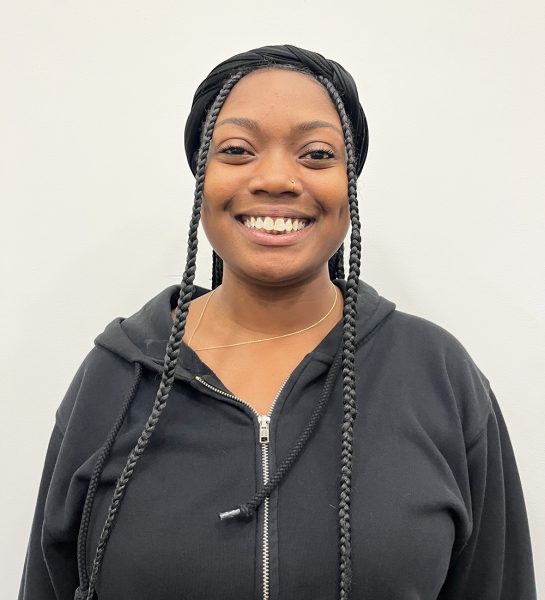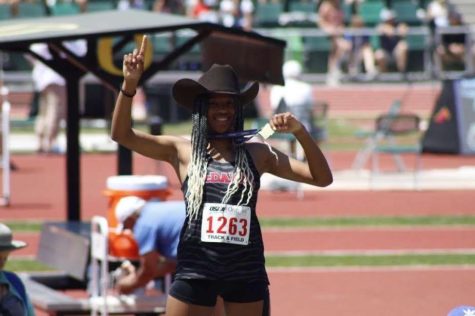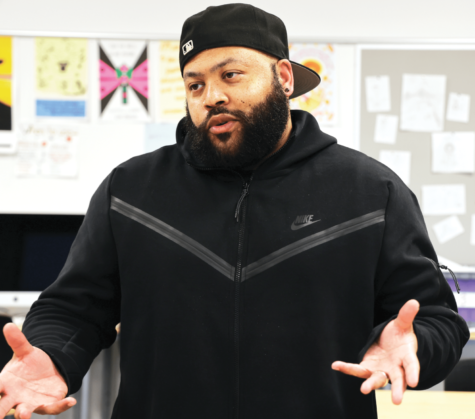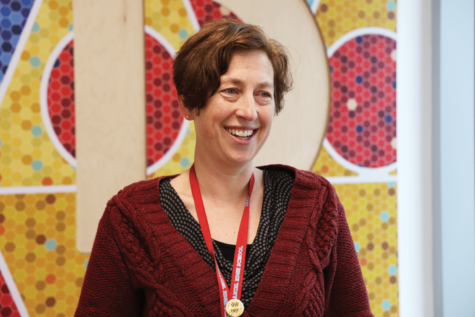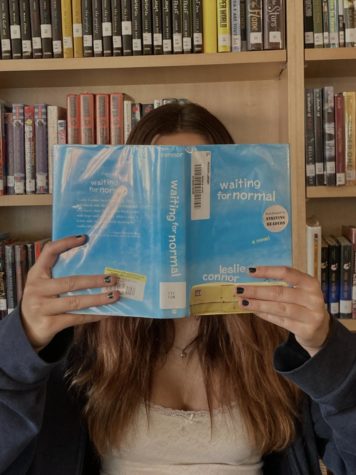Setterholm Tells Her Story After 30 Years at McDaniel
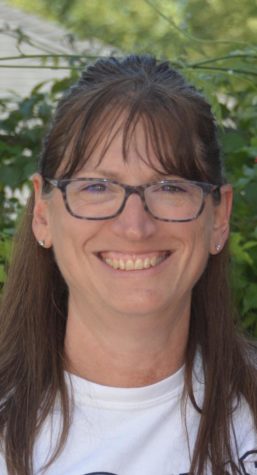
Suzy Setterholm, currently a health teacher, is retiring at the end of this year. Her 30-year career has been full of stories, moments, memories and friendships.
Setterholm grew up in Portland, a single child with a single mom. She describes herself as an athletic kid. There weren’t many sports options at the time, especially for women, but she was always physically active. She played outside all the time, ran around a lot, and was generally an active child.
After attending Vestal for elementary and middle school, she came to McDaniel (Madison at the time) for her high school years. She tried softball in her freshman year, but was terrible at it. Her coach was kind enough not to cut her, but it just wasn’t the right fit.
“A few weeks into those first few practices I just realized this isn’t my sport,” Setterholm says.
Setterholm was convinced to try track and field by some of her friends who were on the team. She loved it and went directly from softball to track. It would become the sport she did all the way through the end of high school, and all the way through college.
Setterholm described her experience as a student at McDaniel as a typical high school for the time: the teachers were the old school “sit at your desk and pay attention” types (relationships between teachers weren’t as valued); school spirit was more active, and the teaching staff was less diverse. There wasn’t the emphasis on social justice then as now, but Setterholm said the student body was diverse, even back then.
After McDaniel, Setterholm went to the University of Oregon, where she continued to run track. After an ill-fated declaration of a psychology major (freshmen were required to pick something), she pivoted to a telecommunications and film major, which she did until halfway through her junior year.
Although the classes were enjoyable, she didn’t know what she was going to do with the major, so she decided to pivot once again to something else. But to what?
As an athlete at the university, she was often asked to work with younger kids at track-and-field summer camps, so the idea of being a coach appealed to her. However, she needed a career to go with coaching.
“What kind of a career matches up with coaching?” Setterholm says. “You have to be available by three in the afternoon, that’s not a lot of jobs […] unless you’re a teacher.”
And so it was. Halfway through her junior year, she switched her major to health education. As an athlete, she was already interested in the subject, so it seemed perfect. Switching your major halfway through your junior year is no easy feat, however, and it required her to attend college a total of five years. But at the end of it, she had her health education degree in hand.
When she was fresh out of college and looking for work, her former yearbook advisor Kathy Renwick-Geisler let Setterholm know she was transferring out of the yearbook, and that the newspaper person was bowing out too. Setterholm had been with the yearbook and newspaper in high school and had taken many journalism classes in college. She applied for the position, was accepted, and officially started teaching in the fall of 1991.
During her time as the newspaper advisor, Setterhholm remembers staying at the school until 10 or 11 o’clock at night, trying to get the paper finished. She especially recalls the April Fools articles the newspaper would print, such as saying that Mickey Mouse had won the presidential election or finding celebrity doppelgangers for teachers.
“I would laugh so hard at some stuff […] that I would be crying.” Setterholm says. “It was good for the soul, because pretty much everything else we were doing when we were doing the ‘real paper’ was much more [uninteresting].”
One story she specifically remembers was when she had just started teaching. The paper decided to do an issue about teen pregnancy.
“This was 1992-93, this wasn’t something that you were going to see a lot in a school newspaper,” Settetholm says.
The issue contained an anonymous interview with a teen who had been pregnant, and the cover was of, as Setterholm describes it, a “Roman, kind of nude statue […] of this well embodied woman who looked like she was with child.”
The principal apparently wasn’t a fan of the issue, but Setterholm’s health background convinced her that it was a necessary thing to talk about.
“I don’t regret a minute of it, I’d do it all over again,” Setterholm says.
She started part-time as the yearbook and newspaper advisor, until she was asked to teach Personal Finance and Career Development for a full-time paycheck. She accepted.
“You didn’t even have to be certified in it,” Setterholm says.
She was barely out of college at the time, in her early 20’s, so being tapped to teach Personal Finance and Career Development was surprising to her.
“I wasn’t good at managing my own money,” Setterholm says. “Let alone telling other people how to do it.”
One year, she was even asked to be a freshman English teacher. At the time, one could teach outside their degree, thus why a health major was able to teach English. According to Setterholm, her senior TA essentially taught the class for her.
Finally, in the fall of 1994, a health teacher retired, and Setterholm was put into the position, where she’s stayed ever since.
Setterholm feels incredibly passionate about the subject of health, which she had spent almost her entire adult life teaching.
“Health is one of those classes that everything we talk about has some application to who we are as a person,” Setterholm says. “Without your health, nothing else really matters. A health class is probably one of the most important classes taught at our school, and yet we don’t necessarily hold it to that regard.”
It’s also clear, however, that Setterholm derives more from her teaching than simply the importance of her subject.
“Connecting with kids, and learning as much from them as I hope they learn from me,” Setterholm says about what she loves about teaching. “Sometimes I feel like I probably learn way more from them than they learn from me.”
Setterholm is clearly dedicated to her students. During her time at McDaniel, she recalled really connecting with the few teachers who valued relationships with students. When Setterholm became a teacher herself, she decided to emulate that. And when discussing her students, it’s clear she really cares about them.
“I’ve just been blown away by the knowledge that our kids have,” Setterholm says. “And I’m constantly inspired by, but not surprised by, how intelligent and bright and thoughtful you guys all are.”
Here she paused for a second, before continuing, “I’ll get too emotional if I say too much more.”
Nancy Sullivan, McDaniel librarian and long-time friend of Setterholm, affirmed Setterholm’s dedication.
“The thing that’s best about Suzy is that she is a true friend,” Sullivan says. “She is totally someone that you can rely on no matter what. […] She’s just such a loyal and devoted and solid friend And not just to adults. […] She’s that same sort of stable rock you can always depend on for students as well.”
Sullivan told a story about Setterholm that truly illustrates what a true friend Setterholm is.
It began when Sullivan expressed a desire for a library assistant, something that she’s intermittently had. Setterholm then took it upon herself to raise the money for such an assistant, and came up with a plan: Read A Latte.
“She basically ran a latte stand out of the textbook room window,” Sullivan says.
Every morning before school started, Setterholm would be selling lattes. Each of the cups would have a quote from a book or author on them, and all the proceeds went to raise money for a library assistant. Setterholm was the one that bought the ingredients and ran the stand; she even employed student runners to bring teachers their orders.
Keep in mind that Setterholm is a health teacher, not a librarian. Regardless, according to Sullivan, she’s been incredibly supportive of the library, from speaking about the importance of libraries at community events to participating in Library Legislative Day (a day when community members make appointments with their representatives to tell them the importance of libraries).
“ I mean, she’s not even a school librarian, she’s just a super supportive person,” Sullivan says.
Unfortunately, every career must come to an end. Setterholm stopped doing the newspaper after about 5 years, and stopped doing the yearbook in 2003. Now, in 2021, she’s decided to retire for good.
In explaining why she decided to retire, Setterholm gave a few reasons. First, she simply feels that 30 years is long enough to do one thing, and she wants to branch out.
“There’s other things I’d like to explore,” Setterholm says. “I can very likely still be working with kids in some capacity, but again, maybe don’t have to have it be this full time job.”
Setterholm also feels that the staff at McDaniel should be more diverse, and that her retirement might provide an opportunity for that to occur.
“We have a predominantly white staff, and I think many of those individuals are really good at understanding their white privilege and work real hard to be as equitable as possible. […] But, I also think it’s really important to see yourself in your teachers,” Setterholm says.
It’s clear, however, that Setterholm has mixed feelings about her retirement.
“I’m like 50% excited and 50% apprehensive,” Setterholm. “Excited because it’s this whole new opportunity to discover some new stuff and try some new things […] and maybe find some interests and hobbies I don’t even know I have. […] And yet it’s also apprehensive because I’ve only ever identified myself as a teacher. I mean, I’ve been doing this since I was 24 years old, and it’s going to take some time to figure out who I am outside of being that person.”
When someone is retiring, it can be tempting to sum up their entire career in a brief paragraph, as a way of bringing closure. But Setterholm sees it differently.
“I believe in growth, and I believe we should try to continue to grow our whole lives until the bitter, bitter end,” Setterholm says. “I don’t feel like I’m someone who still couldn’t do another 30 years of teaching and learn 30 more years worth of stuff.”
To her, retirement isn’t an end, isn’t something that needs closure. It’s a new beginning, one where she can explore new sides of herself.
There is reason to see, however, that she might not be gone from McDaniel entirely.
“She has said she might be willing to volunteer some of her time in the school library when we get to the new building,” Sullivan says. “I really think she will [still be involved at McDaniel] because she has so much energy still, she’s so young, and she still has a lot to offer.”

Zane Emerson is a senior, and loves writing stories about politics, books, or whatever he’s interested in at the moment. People describe him as funny, competitive, and a nerd. He loves being a journalist because he has the freedom to explore interesting ideas and share them with the world. When he’s not writing a story, he likes to play board games, watch football (Go Seahawks!), and spend time...


